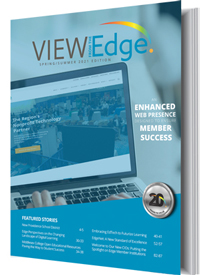One of the biggest challenges facing college students today is not only affording tuition, but finding ways to cover all the additional costs that go along with attending classes. A trip to the bookstore can often cost several hundred dollars; in fact, textbook prices have experienced a steep incline, rising 135% since 2001.1 Among the solutions that aim to reduce the burden of college costs for students and expand the access of learning resources to more individuals are Open Educational Resources (OER). OER are teaching, learning, and research materials that reside in the public domain or have been released under an intellectual property license that permits their free use and repurposing by others. Ranging from full courses and textbooks to lesson plans, individual videos, and test questions, OER provides affordable material to students and more diverse content for instructors to further customize and enhance their classes.
At Middlesex College, 46-percent of students receive need-based aid and 26-percent of students have a household income less than $30,000. To help ensure their students are successful and complete their degree or certificate program, the College has made OER a top priority. “With many of our students needing financial aid to attend, we had to go beyond capping tuition and fees,” says Marilyn Ochoa, Director of Library Services, Middlesex College. “Within our 5-year OER plan, we have aligned to our College’s strategic plan that includes initiatives that support access and affordability. We are also very fortunate to have faculty who are dedicated to helping students stay in the classroom and receive an exceptional educational experience.” Linda Scherr, Vice President of Academic Affairs, Middlesex College, adds, “As a community college, where affordability is part of our mission, we’ve been taking a hard look in recent years about the cost of attendance beyond tuition and fees. We want to make sure that students have access to high-quality materials from day one and that’s the hallmark of today’s OER materials.”
“Our partners include Passaic County Community College, Ocean County College, Brookdale Community College, Rowan University, and the New Jersey Council of County Colleges (NJCCC). We also have thirteen expansion community colleges that are helping us to disseminate information about our project that focuses on career and technical education STEM courses. The three-year project will align to the career pathways that the NJCCC has identified as growth industries: health services, innovation and technology, energy, and global manufacturing and supply chain management. Our goal is to help students build stackable credentials that enable them to successfully find positions in jobs that focus on new STEM areas.”
– Marilyn Ochoa

Championing the Benefits of OER
Middlesex College has been involved in OER since 2018 and began exploring these resources in two highly-enrolled areas, English and mathematics. “One hundred-percent of students, regardless of their major, are going to take English and some mathematics, and could benefit from OER,” explains Scherr. “We have extremely dedicated faculty who were working with these materials, developing them, championing OER and their benefits, and who were willing to mentor other faculty members interested in these resources. These advocates presented their own work to others to raise awareness and excitement about the high quality of materials available and show how OER can help instructors be more effective inside and outside of the classroom. People are developing wonderful ancillaries, test questions, and PowerPoints to accompany courses, and today’s OER software is helping take the benefits of these resources even further.”
Middlesex College recently received a grant related to OER development and use funded through the US Department of Education’s Fund for the Improvement of Postsecondary Education. The Open Textbook Collaborative (OTC) project will engage a consortium of New Jersey community colleges and Rowan University to develop OER in career and technical education STEM courses and help students stay on course to career opportunities in growth industries. “Our partners include Passaic County Community College, Ocean County College, Brookdale Community College, Rowan University, and the New Jersey Council of County Colleges (NJCCC),” shares Ochoa. “We also have thirteen expansion community colleges that are helping us to disseminate information about our project that focuses on career and technical education STEM courses. The three-year project will align to the career pathways that the NJCCC has identified as growth industries: health services, innovation and technology, energy, and global manufacturing and supply chain management. Our goal is to help students build stackable credentials that enable them to successfully find positions in jobs that focus on new STEM areas.”
The OTC project aims to create up to twelve OER courses that include textbooks plus ancillary materials, like lesson plans, that help faculty members to teach a class. In addition, the project is creating communities of practice where academic, industry, and workforce partners can talk about curriculum, identify the gaps, and pinpoint what content needs to be created as OER. “We are also developing an open publishing tool which allows faculty members to create OER material directly into a repository that is already open source,” explains Ochoa. “This tool allows institutions that do not have access to repository systems to be able to host those materials in one place. Those in the state and beyond can also see all of the OER materials that have been adopted throughout the region. This is an exciting opportunity for us to spread the word about OER and for faculty members to understand the scope of high-quality materials that are available. We hope to expand this project to develop different processes for other areas of study, where the documentation we create can be referenced for OER development in other disciplines beyond STEM.”
The OTC Advisory Council leads strategic initiatives and approves OER course projects that are recommended by the curriculum committees to achieve the project goals and benchmarks. With Edge’s involvement with the New Jersey’s Virtual Academic Library Environment (VALE) and NJ Transfer, Middlesex brought in Edge as a partner and counsel in their pursuit of the OTC project grant. Dr. Forough Ghahramani, Associate Vice President for Research, Innovation, and Sponsored Programs, Edge, met with Middlesex College to discuss how to best connect with VALE and NJ Transfer and how these entities could help enhance their mission of expanding access to educational resources. “Dr. Ghahramani Forough will be part of the innovation and technology curriculum committee, as well as serving on the Advisory Council to help us effectively disseminate our work that is happening throughout the project at both a team and Advisory Council level,” explains Ochoa. “We are also very excited to work with Edge’s Josh Gaul, Executive Director, EdgeLearn, who will serve as our educational technology manager to oversee course design. He will also be helping us by weighing in on the open publishing tool for faculty; developing this resource as an expert user in learning technologies.”
“With this grant, we will be able to further build the capacity for OER at Middlesex College and throughout New Jersey; creating many new OER champions. These mentors will be extraordinary game changers statewide, building a substantial foundation for OER that allows us to pave the way for the future.”
– Linda Scherr

Looking to Faculty Leaders
In May 2019, New Jersey passed a law that requires each institution of higher education to submit a plan that included the use of open textbooks and commercial digital learning materials that are free or at a reduced cost. “Many institutions included OER in their textbook affordability plans,” says Ochoa. “For those who have not yet decided on OER, I would encourage leaders to talk to their faculty, because those members may have already begun using these resources at a grass roots level. Looking to faculty and library staff as leaders is extremely important for an institution to be successful in expanding access to educational resources. Through our grant project, we will be providing opportunities for faculty, administrators, and staff to learn about OER and the tools we are developing. Many organizations are not aware of the robust materials available. Open education resources are growing exponentially and new materials are being added frequently.”
With a mission of improving student learning outcomes and developing sustainable and replicable practices, the OTC project will have an impressive impact on helping to reduce the burden of college costs for students. “With this grant, we will be able to further build the capacity for OER at Middlesex College and throughout New Jersey; creating many new OER champions,” says Scherr. “These mentors will be extraordinary game changers statewide, building a substantial foundation for OER that allows us to pave the way for the future.”
1 U.S. Bureau of Labor Statistics. College textbooks in U.S. city average. April 12, 2021.



